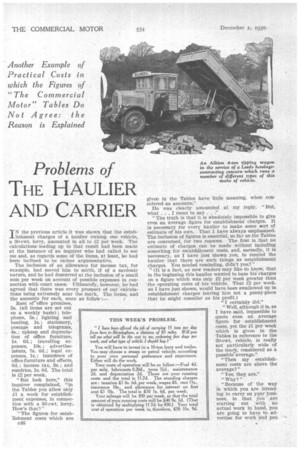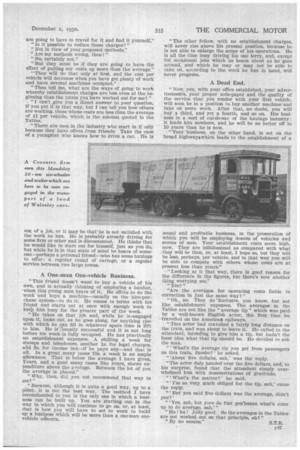Problems of
Page 68

Page 69

If you've noticed an error in this article please click here to report it so we can fix it.
THE HAULIER
AND CARRIER
IN the previous article it was shown that the establishment charges of a haulier owning one vehicle, a 30-cwt. lorry, amounted in all to £2 per week. The calculations-leading up to that result had been made at the instance of an inquirer who had called to see me and, as regards some of the items, at least, he had been inclined to be rather argumentative.
The inclusion of an allowance for income tax, for example, had moved him to mirth, if (A a sardonic nature, and he had demurred at the inclusion of a small sum per week on account of possible expenses in connection with court cases. Ultimately, however, he had agreed that there was every prospect of our calculations being extremely near the mark. The items, and the amounts for each, were as folloW:—
Rent of-office premises, 5s. (all items are •set out on a weekly basis) ; telephone, 5s.; lighting and beating, is.; stationery, postage and telegrams, 4s.; upkeep and depreciation of office furniture, is. 6d.; travelling expenses, 10s. ; advertisements, 7s. 6d.; legal expenses, 1s. ; insurance of office furniture and effects, lid.; income tax, 3s.; and sundries, is. 6d. The total is 12 per week.
"But look here," this inquirer complained, "in the Tables you allow only D. a week for establishment expenses, in connection with a 30-cwt. lorry. How's that?"
"The figures for establishment costs which are e40 given in the Tables have little meaning, when considered as amounts:" He was clearly aStoundecl what . . . I mean to say . . ."
"The truth is that it is absolutely impossible to give even an average figure for establishment charges. It is necessary for every haulier to make some sort Of estimate of his own. That I have always emphasized. The inclusion of figures is essential, so far as the Tables are concerned, for two reasons. The first is that no estimate of charges can be made without including something for establiihment costs, and, secondly, it is necessary, as I have just shown you, to remind the haulier that there are such things as establishment charges. You needed reminding, didn't you?" (It is a fact, as new readers may like to know, that in the beginning this haulier wanted to base his' charges on a figure which was only £2 per week greater than the operating costs of his vehicle. That 12 per week. as I have just shown, would have been swallowed up in establishment charges leaving him not a penny-piece that he might consider as his profit.)
at my reply. " But,
"I certainly did."
"Well, although it is, as I have said, impossible to .quote even an average figure for establishment costs, yet the £1 per week which is given in the Tables in reference to the 30-cwt. vehicle, is really not particularly wide of the mark, considered as a possible' average."
"Then my establishment costs are above the average?"
"Yes, they are."
" Why? "
"Because of the way in which you are intending to carry on nur .business, in that you are starting out with no actual work in hand, you are going to have to advertise for work and you are going to have to travel for it and find it yourself."
"Is it possible to reduce these charges?"
"Not in view of your proposed methods."
"Are my methods wrong, then?
"No, certainly not."
"But they must be if they are going to have the effect of putting my costs up more than the average."
• "They will do that only at first, and the cost per vehicle will decrease when you have got plenty of work and have several machines occupied."
"Then tell me, what are the ways of going to work whereby establishment charges are less even at the beginning than the totals you have worked out for me?"
"I can't give you a direct answer to your question, if you put it in that way, but I can tell you how others are working, those whose costs are less than the average of £1 per vehicle, which is the amount quoted in the Tables.
"There are men in the industry who start in it only because they have offers from friends. Take the case of a youngster who knows how to drive a car. He is out of a job, or it may be that'he is not satisfied with the work he has. He is probably already driving for some firm or other and is discontented. He thinks that he would like to start out for himself, just as you do, but while he is in that state of mind he hears of someone—perhaps a personal friend—who has some haulage to offer; a regular round of cartage, or a regular service between two large towns.
A One-man One-vehicle Business.
"This friend doesn't want to buy a vehicle of his own, and is actually thinking of employing a haulier, when this young man hears of it. He offers to do the work and buys a machine—usually on the hire-purchase system—to do it. He comes to terms with his friend and starts out at once with enough work to keep him busy for the greater part of the week.
"He takes on that job and, while he is,eengaged upon it, looks out, as he goes along, for anything else with which he can fill in whatever spare time is left to him. He is :sually successful and it is not long before his week is fully occupied. He has practically no establishment expenses. A shilling a week for stamps and telephones, another is. for legal charges, arid 3s. for income tax—if he pays any—and that is all. In a great many cases 10s. a week is an ample allowance. That is below the average I have given. Yours, and a good many cases like yours, shows expenditure above the average. Between the lot of you the average is placed."
"Why, then, did you not recommend that way to me?"
"Because, although. it is quite a good way, up to a pint, it is not the best way. The method I have reconithended to you is the only one in which a business can be built up. You are starting out in the way in which you will continue to go on, or, at least, that is how you will have to set to work to build up a business which will be more than a one-man onevehicle cOncern.
"The other fellow, with no establishment charges, will never rise above his present position, because he is not able to enlarge the scope of his operations. He is all the time busy driving his one lorry, and, except for occasional jobs which he hears about as he goes around, and which he may or may not be able to take on, according to the work he has in hand, will never progress.
A Dead End.
"Now, you, with your office established, your advertisements, your proper note-paper and the quality of the service that you render with your first vehicle, will soon be in a position to buy another machine and take on more work. After that, no doubt, you will buy a third, and yet a fourth, and so on. His business is a sort of cul-de-sac of the haulage industry; it leads him nowhere, and he will be no better off in 10 years than he is now.
"'Your business, on the other hand, is set on the broad highwayowilich leads to the establishment of a sound and profitable business, in the prosecution of which you will be employing dozens of vehicles and scores of men. Your establishment costs seem • high, now. They are infinitesimal as compared with what they will be then, or, at least, I hope so, but they will be less, perhaps, per vehicle, and in that way you will be able to compete with others whose costs are at present less than yours."
"Looking at it that way, there is good reason for the differenee in the figures, but there's now another thing worrying me."
"Yes? "
"Are the averages for operating costs liable to correction in just the same way?"
" no. They do 'fluctuate, you know, but not like establishment expenses. The averages in the Tables are not like the "average tip" which was paid by a well-known English actor, the first time he -travelled on the American railways.
"This actor had travelled a fairly long distance on the train, and was about to leave it. He called to the attendant, intending to give him a tip, but hadn't the least idea what that tip should be. He decided to ask the man.
"'What's •the average tip you get from passengers on this train, Sambo? ' he asked.
"'About five dollahs, sail,' was the reply.
"The actor duly handed over the five dollars, and, to his surprise, found that the attendant simply overwhelmed him with demonstrations of gratitude.
What's the matter?' he said.
" I'm so very much obliged for the tip, salt,' came the reply.
"'But you said five dollars was the average, didn't you? '
"'Yes, sah, but yore de fust getfleman what's come up to de average, sah.' " "Ha I ha! Jolly good. So the averages in the Tables are not worked out on that principle, eh?"
"By no means." S.T.R.












































































































